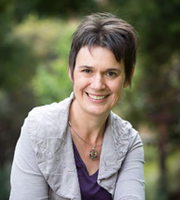Elizabeth Leane’s mission is to integrate science and the humanities. And her latest project will take that mission global.
Associate Professor Leane’s slightly unusual dual expertise of science and English (Arts and IMAS) makes her the perfect person for the task.
And she has just secured an ARC Linkage Grant that will bring together researchers and communities around the world to focus on Antarctica.
Antarctic Cities and the Global Commons: Rethinking the Gateways will conduct an in-depth study of three of the five Antarctic gateways: Hobart, Christchurch, and Punta Arenas in Chile.
Researchers from a variety of disciplines and nations will work on the project, which is led by Associate Professor Juan Salazar of Western Sydney University. Their expertise spans everything from software studies to urban studies to English.
“People have written about these places as polar gateways for a long time, but they tend to be seen as far-flung ports that northern hemisphere traffic passes through or back from, on its way to or from Antarctica.
They’re all connected to each other, they all have similar roles and they all have a strong relationship to Antarctica. One of our goals is to increase the connections between them and increase people’s knowledge in each city of the other gateway cities.
Bringing together communities around the world
“We are looking at what can we do to encourage citizens of these cities to see themselves as being invested in Antarctica’s future by merit of their location at the gateways.
One of our ideas is something called an Antarctica connectiveness index, which is going to be an empirical measure of how each city is related to the Antarctic. Punta Arenas, for example, is used as a gateway by many national Antarctic programs, and here in Hobart, science is very strong. Each city has something different to offer. That index will be a picture of that.
“We are also going to create a sustainability index for each city, which is not just environmental, but economic, cultural, and political.
“We are thinking about these cities not just as gateways, but as places that are engaged with Antarctica in a very in-depth way. We want to help the different cities learn from each other, rather than see themselves in competition with each other."
There are four global commons
The ocean, the atmosphere, Antarctica and outer space
The youth of today, the future of Antarctica
“One of the things we want to do is engage young people in particular. They are the future of our relationship with Antarctica.
“We are going to develop an online game they can play that imagines different scenarios for Antarctica’s future, and different scenarios for the cities’ relationships with Antarctica.
“One of the things we are considering with the game is that it could potentially be in a public place, and players could connect with people around the world at the other gateways.
They can play the game in each city, so we would have contributors coming from each. Eventually we hope to choose one young person from each city and actually take them on a trip to Antarctica.
“We also hope to catalyse what we might call an Antarctic youth forum, which would be held every few years in one of the gateway cities, in which young people would get together to talk about the issues facing Antarctica.
“At the University and in scientific circles, Antarctica is an everyday thing. But I think that a lot of people in Hobart may not even know that Australia has a claim on the place. Their knowledge may be fairly scant and that’s one of the things we have to figure out.
Increasingly, Humanities academics are finding each other and creating a community of people who have expertise in the Antarctic. In mainstream humanities, it really isn’t on people’s radars. We have to build up a scholarly community that is interested in this area. I’m very keen on incorporating those perspectives. This is a big step in that direction.
The research team
Associate Professor Juan Salazar, Chief Investigator, University of Western Sydney
Professor Paul James, Chief Investigator, University of Western Sydney
Associate Professor Elizabeth Leane, Chief Investigator, University of Tasmania
Dr Liam Magee, Chief Investigator, University of Western Sydney
Mr Tim Short, Partner Investigator, Hobart City Council
Dr Daniela Liggett, Partner Investigator, University of Canterbury
Mr Elías Barticevic, Partner Investigator, Chilean Antarctic Institute
Professor Dr Claudia Estrada Goic, Partner Investigator, University of Magallanes
Antarctic Tasmania (Department of State Growth), partner organisation
This project is supported by an Australian Research Council Linkage grant.
Interested in conducting your own research? Apply now to become a research student.
